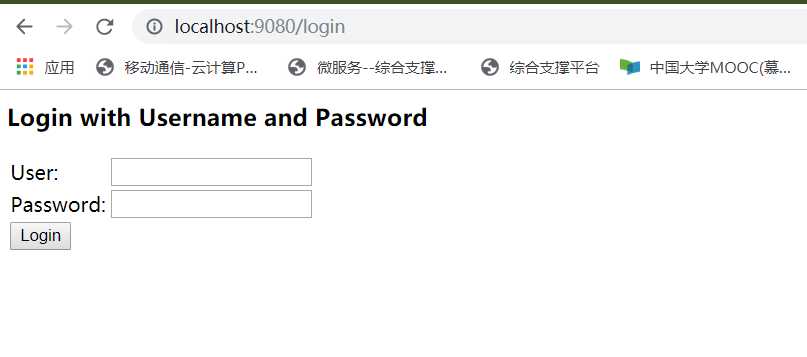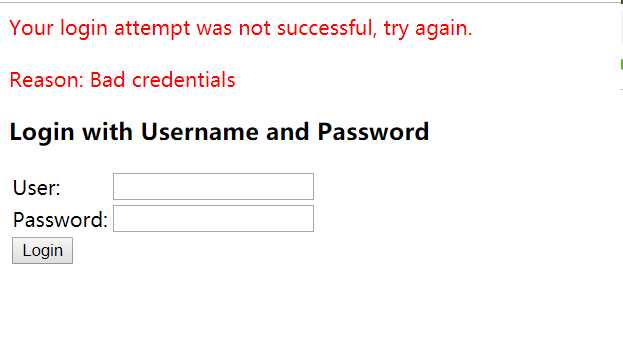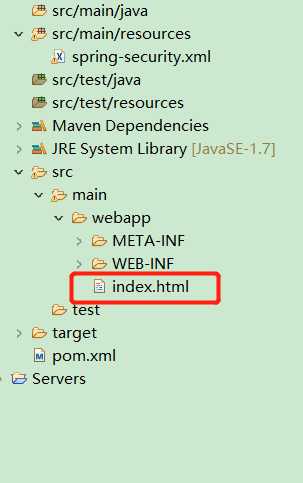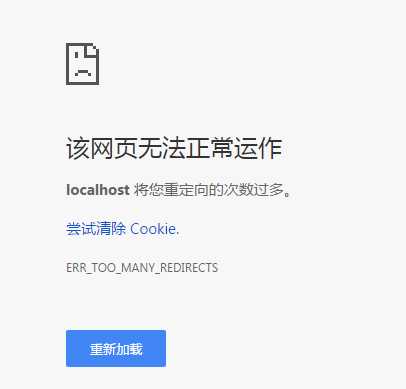标签:mapping 目录 ant tac listen dex 依赖注入 pattern cat
spring-cecurity的简介:
Spring Security是一个能够为基于Spring的企业应用系统提供声明式的安全访问控制解决方案的安全框架。它提供了一组可以在Spring应用上下文中配置的Bean,充分利用了Spring IoC,DI(控制反转Inversion of Control ,DI:Dependency Injection 依赖注入)和AOP(面向切面编程)功能,为应用系统提供声明式的安全访问控制功能,减少了为企业系统安全控制编写大量重复代码的工作。
本博客包含的功能:
1)使用基本的spring-security demo的实现,采用spring-security默认的登录
2)在spring-security的基础上自定义登录页面以及注销功能
3)使用spring-security数据库中获取数据进行登录验证
1.新建一个war包类型的maven项目
注:新建的maven工程需要转换为Web工程的方法和项目的pom.xml中报错:web.xml is missing and <failOnMissingWebXml> is set to true 解决方法请看:
https://www.cnblogs.com/sun-flower1314/p/11732915.html
2.在pom.xml中加入Spring Security的maven配置
<properties>
<spring.version>4.2.4.RELEASE</spring.version>
</properties>
<dependencies>
<dependency>
<groupId>org.springframework</groupId>
<artifactId>spring-core</artifactId>
<version>${spring.version}</version>
</dependency>
<dependency>
<groupId>org.springframework</groupId>
<artifactId>spring-web</artifactId>
<version>${spring.version}</version>
</dependency>
<dependency>
<groupId>org.springframework</groupId>
<artifactId>spring-webmvc</artifactId>
<version>${spring.version}</version>
</dependency>
<dependency>
<groupId>org.springframework</groupId>
<artifactId>spring-context-support</artifactId>
<version>${spring.version}</version>
</dependency>
<dependency>
<groupId>org.springframework.security</groupId>
<artifactId>spring-security-web</artifactId>
<version>4.1.0.RELEASE</version>
</dependency>
<dependency>
<groupId>org.springframework.security</groupId>
<artifactId>spring-security-config</artifactId>
<version>4.1.0.RELEASE</version>
</dependency>
</dependencies>
<build>
<plugins>
<!-- java编译插件 -->
<plugin>
<groupId>org.apache.maven.plugins</groupId>
<artifactId>maven-compiler-plugin</artifactId>
<version>3.2</version>
<configuration>
<source>1.7</source>
<target>1.7</target>
<encoding>UTF-8</encoding>
</configuration>
</plugin>
<plugin>
<groupId>org.apache.tomcat.maven</groupId>
<artifactId>tomcat7-maven-plugin</artifactId>
<configuration>
<!-- 指定端口 -->
<port>9080</port>
<!-- 请求路径 -->
<path>/</path>
</configuration>
</plugin>
</plugins>
</build>
3.在/src/main/resources下新建spring-security.xml的配置文件。
该配置文件与以往的稍有不同,需要注意的点有:
以往的前缀<beans ></beans>是直接这样,是默认为beans
现在的为<beans:beans > </beans:beans>,默认的xmlns为security的,因为这里使用的基本都是以<security:xxx >开头,为了省去麻烦,所以将security配置为默认的。
<?xml version="1.0" encoding="UTF-8"?> <beans:beans xmlns="http://www.springframework.org/schema/security" xmlns:beans="http://www.springframework.org/schema/beans" xmlns:xsi="http://www.w3.org/2001/XMLSchema-instance" xsi:schemaLocation="http://www.springframework.org/schema/beans http://www.springframework.org/schema/beans/spring-beans.xsd http://www.springframework.org/schema/security http://www.springframework.org/schema/security/spring-security.xsd"> <http use-expressions="false"> <intercept-url pattern="/**" access="ROLE_USER" /> <form-login /> </http> <!-- 认证管理器 --> <authentication-manager> <authentication-provider> <user-service> <user name="admin" password="123456" authorities="ROLE_USER" /> </user-service> </authentication-provider> </authentication-manager> </beans:beans>
spring-security.xml配置文件中属性说明:
<1> <http >标签中:属性use-expressions 表示是否启动SPEL表达式 false表示不启用,若不配置use-expressions属性,则在子标签intercept-url中需配置access=hasRole(‘ROLE_USER‘)
<2><intercept-url>表示拦截url,其属性pattern="/*" 表示只拦截根目录下的资源,不包括子目录中的资源, /** 拦截所有资源; 属性access表示配置角色名称 其值必须是【ROLE_】开头
<3><form-login /> 表示开启表单功能
<4><authentication-provider> 表示认证提供者
<5><user >标签配置当前系统的登录用户:用户名 name; 密码 password; 当前用户所属角色 authorities
4.配置web.xml文件,整个文件为:
其中包含加载了classpath:spring-security.xml文件以及加入了一个安全过滤器,其中的springSecurityFilterChain为固定名称,不能改变
<?xml version="1.0" encoding="UTF-8"?> <web-app xmlns:xsi="http://www.w3.org/2001/XMLSchema-instance" xmlns="http://java.sun.com/xml/ns/javaee" xsi:schemaLocation="http://java.sun.com/xml/ns/javaee http://java.sun.com/xml/ns/javaee/web-app_2_5.xsd" version="2.5"> <context-param> <param-name>contextConfigLocation</param-name> <param-value>classpath:spring-security.xml</param-value> </context-param> <listener> <listener-class> org.springframework.web.context.ContextLoaderListener </listener-class> </listener> <!-- 安全过滤器 --> <filter> <filter-name>springSecurityFilterChain</filter-name> <filter-class>org.springframework.web.filter.DelegatingFilterProxy</filter-class> </filter> <filter-mapping> <filter-name>springSecurityFilterChain</filter-name> <url-pattern>/*</url-pattern> </filter-mapping> </web-app>
5. 然后启动用maven命令启动项目,tomcat7:run ,启动成功后,在浏览器中输入地址访问,即使没有写任何界面,也可看到security默认的登录界面:

6.输入用户名和密码,若输入错误的用户名和密码,可看到如下界面:

输入正确用户密码登录后,会显示404错误,因为没有配置默认的首页,在webapp下配置index.html页面即可。

7.用户自定义登录页
实际开发中,不可能使用系统的默认登录页
1)构建登录页
①form表单中规定 action=“/login" method="post"
②<input >输入用户规定的 name="username";输入密码框规定name="password"
即如下所示:
<form action=‘/login‘ method=‘POST‘> <table> <tr> <td>用户名:</td> <td><input type=‘text‘ name=‘username‘ value=‘‘></td> </tr> <tr> <td>密码:</td> <td><input type=‘password‘ name=‘password‘ /></td> </tr> <tr> <td colspan=‘2‘><input name="submit" type="submit" value="登陆" /></td> </tr> </table> </form>
2)构建登陆失败页 login_error.html(内容略)
3)再次修改spring-security.xml的配置文件
增加配置说明如下:
<1>login-page:指定登录页面。
<2>authentication-failure-url:指定了身份验证失败时跳转到的页面。
<3>default-target-url:指定了成功进行身份验证和授权后默认呈现给用户的页面。
<4>csrf disabled="true" 关闭csrf
<5><headers><frame-options policy="SAMEORIGIN"/> </headers> 表示在页面中还存在iframe标签嵌入其他页面
<6><logout/> 表示注销退出,并且在注销按钮中配置的action为:/logout
<!-- 以下页面不被拦截 -->
<http pattern="/login.html" security="none"></http>
<http pattern="/login_error.html" security="none"></http>
<!-- 页面拦截规则 -->
<http use-expressions="false">
<intercept-url pattern="/*" access="ROLE_USER" />
<form-login login-page="/login.html" default-target-url="/index.html" authentication-failure-url="/login_error.html" always-use-default-target="true" />
<csrf disabled="true"/>
<!-- <headers>
<frame-options policy="SAMEORIGIN"/>
</headers> -->
<logout/>
</http>
其中security="none"表示次资源不被拦截,若未设置登录页,则会出现以下错误

csrf disabled="true" 关闭csrf ,如果不加会出现错误,CSRF(Cross-site request forgery)跨站请求伪造,也被称为“One Click Attack”或者Session Riding,通常缩写为CSRF或者XSRF,是一种对网站的恶意利用。

8、从数据库中匹配用户名和密码,而不用配置文件中的用户名和密码
1)编写验证实现类,即继承Security自带的接口UserDetailsService
LoginCheck.java
package com.hxc.securityDemo; import java.util.ArrayList; import java.util.List; import org.springframework.security.core.GrantedAuthority; import org.springframework.security.core.authority.SimpleGrantedAuthority; import org.springframework.security.core.userdetails.User; import org.springframework.security.core.userdetails.UserDetails; import org.springframework.security.core.userdetails.UserDetailsService; import org.springframework.security.core.userdetails.UsernameNotFoundException; public class LoginCheck implements UserDetailsService { @Override public UserDetails loadUserByUsername(String username) throws UsernameNotFoundException { //1.构建角色列表 List<GrantedAuthority> grantedAuthorities = new ArrayList<GrantedAuthority>(); grantedAuthorities.add(new SimpleGrantedAuthority("ROLE_ADMIN")); String password = "123456"; //2.从数据库中查询数据进行检验 // TbUser tbUser = userService.findOne(username); // if(tbUser == null) { // return null; // } // password = tbUser.getPassword(); //... //new User 为Security包中的类,其中第一个参数为登录界面输入的用户名,第二个为后台参数的密码(即从数据库中查询),第三个为权限角色 return new User(username, password, grantedAuthorities); } }
2)在spring-security.xml配置文件中 将认证管理 修改为如下:
<authentication-manager>
<authentication-provider user-service-ref="userDetailService">
</authentication-provider>
</authentication-manager>
<beans:bean id="userDetailService" class="com.hxc.securityDemo.LoginCheck"></beans:bean>
自定义配置完成
标签:mapping 目录 ant tac listen dex 依赖注入 pattern cat
原文地址:https://www.cnblogs.com/sun-flower1314/p/11727667.html